MBA402: Developing a Comprehensive Code of Conduct for NAB
VerifiedAdded on 2023/01/17
|10
|2806
|78
Report
AI Summary
This report presents a comprehensive Code of Conduct for National Australia Bank (NAB), addressing crucial aspects of ethical conduct within the organization. The code is structured to cover key areas including anti-discrimination policies, with provisions against age, gender, race, and other forms of bias, and also includes a section on exploitation, detailing fair wages, working hours, and zero tolerance for sexual, religious, and minority exploitation. The code further addresses corruption, outlining measures against nepotism, bribery, and fraudulent behavior, alongside a section on dishonest and fraudulent behavior, covering accounting fraud, demand draft fraud, bill discounting fraud, and other fraudulent activities. A crucial element is the inclusion of whistleblower protection, detailing anonymous reporting, privacy, compensation, and protection measures. The report emphasizes the importance of enforcement through organizational policies, clearly defined roles, employee training, and disciplinary actions. The report is based on the provided assignment brief which required research on NAB and its ethical practices, incorporating references to relevant literature and external examples to support the code's principles and guidelines.

TITLE PAGE
Paraphrase This Document
Need a fresh take? Get an instant paraphrase of this document with our AI Paraphraser
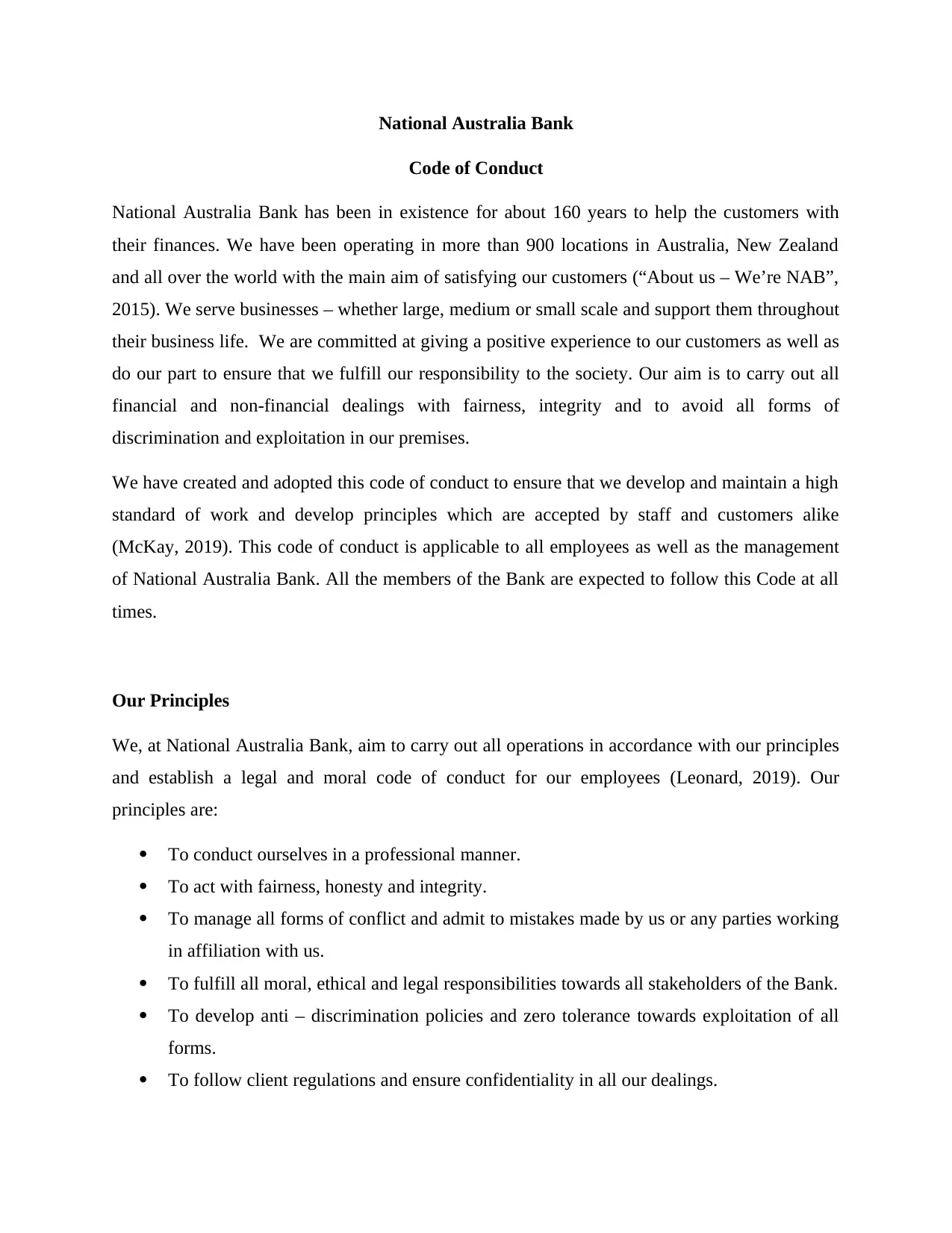
National Australia Bank
Code of Conduct
National Australia Bank has been in existence for about 160 years to help the customers with
their finances. We have been operating in more than 900 locations in Australia, New Zealand
and all over the world with the main aim of satisfying our customers (“About us – We’re NAB”,
2015). We serve businesses – whether large, medium or small scale and support them throughout
their business life. We are committed at giving a positive experience to our customers as well as
do our part to ensure that we fulfill our responsibility to the society. Our aim is to carry out all
financial and non-financial dealings with fairness, integrity and to avoid all forms of
discrimination and exploitation in our premises.
We have created and adopted this code of conduct to ensure that we develop and maintain a high
standard of work and develop principles which are accepted by staff and customers alike
(McKay, 2019). This code of conduct is applicable to all employees as well as the management
of National Australia Bank. All the members of the Bank are expected to follow this Code at all
times.
Our Principles
We, at National Australia Bank, aim to carry out all operations in accordance with our principles
and establish a legal and moral code of conduct for our employees (Leonard, 2019). Our
principles are:
To conduct ourselves in a professional manner.
To act with fairness, honesty and integrity.
To manage all forms of conflict and admit to mistakes made by us or any parties working
in affiliation with us.
To fulfill all moral, ethical and legal responsibilities towards all stakeholders of the Bank.
To develop anti – discrimination policies and zero tolerance towards exploitation of all
forms.
To follow client regulations and ensure confidentiality in all our dealings.
Code of Conduct
National Australia Bank has been in existence for about 160 years to help the customers with
their finances. We have been operating in more than 900 locations in Australia, New Zealand
and all over the world with the main aim of satisfying our customers (“About us – We’re NAB”,
2015). We serve businesses – whether large, medium or small scale and support them throughout
their business life. We are committed at giving a positive experience to our customers as well as
do our part to ensure that we fulfill our responsibility to the society. Our aim is to carry out all
financial and non-financial dealings with fairness, integrity and to avoid all forms of
discrimination and exploitation in our premises.
We have created and adopted this code of conduct to ensure that we develop and maintain a high
standard of work and develop principles which are accepted by staff and customers alike
(McKay, 2019). This code of conduct is applicable to all employees as well as the management
of National Australia Bank. All the members of the Bank are expected to follow this Code at all
times.
Our Principles
We, at National Australia Bank, aim to carry out all operations in accordance with our principles
and establish a legal and moral code of conduct for our employees (Leonard, 2019). Our
principles are:
To conduct ourselves in a professional manner.
To act with fairness, honesty and integrity.
To manage all forms of conflict and admit to mistakes made by us or any parties working
in affiliation with us.
To fulfill all moral, ethical and legal responsibilities towards all stakeholders of the Bank.
To develop anti – discrimination policies and zero tolerance towards exploitation of all
forms.
To follow client regulations and ensure confidentiality in all our dealings.
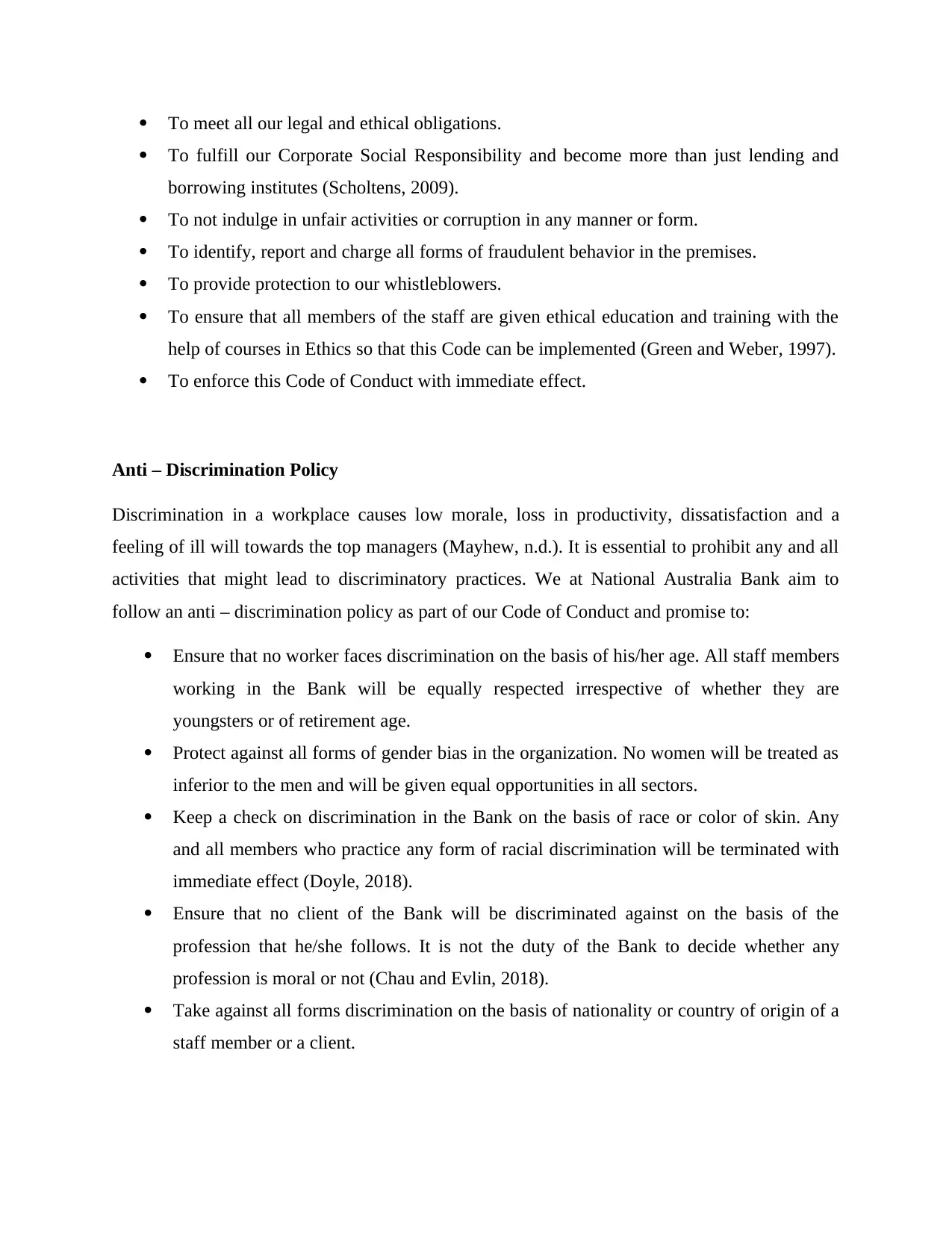
To meet all our legal and ethical obligations.
To fulfill our Corporate Social Responsibility and become more than just lending and
borrowing institutes (Scholtens, 2009).
To not indulge in unfair activities or corruption in any manner or form.
To identify, report and charge all forms of fraudulent behavior in the premises.
To provide protection to our whistleblowers.
To ensure that all members of the staff are given ethical education and training with the
help of courses in Ethics so that this Code can be implemented (Green and Weber, 1997).
To enforce this Code of Conduct with immediate effect.
Anti – Discrimination Policy
Discrimination in a workplace causes low morale, loss in productivity, dissatisfaction and a
feeling of ill will towards the top managers (Mayhew, n.d.). It is essential to prohibit any and all
activities that might lead to discriminatory practices. We at National Australia Bank aim to
follow an anti – discrimination policy as part of our Code of Conduct and promise to:
Ensure that no worker faces discrimination on the basis of his/her age. All staff members
working in the Bank will be equally respected irrespective of whether they are
youngsters or of retirement age.
Protect against all forms of gender bias in the organization. No women will be treated as
inferior to the men and will be given equal opportunities in all sectors.
Keep a check on discrimination in the Bank on the basis of race or color of skin. Any
and all members who practice any form of racial discrimination will be terminated with
immediate effect (Doyle, 2018).
Ensure that no client of the Bank will be discriminated against on the basis of the
profession that he/she follows. It is not the duty of the Bank to decide whether any
profession is moral or not (Chau and Evlin, 2018).
Take against all forms discrimination on the basis of nationality or country of origin of a
staff member or a client.
To fulfill our Corporate Social Responsibility and become more than just lending and
borrowing institutes (Scholtens, 2009).
To not indulge in unfair activities or corruption in any manner or form.
To identify, report and charge all forms of fraudulent behavior in the premises.
To provide protection to our whistleblowers.
To ensure that all members of the staff are given ethical education and training with the
help of courses in Ethics so that this Code can be implemented (Green and Weber, 1997).
To enforce this Code of Conduct with immediate effect.
Anti – Discrimination Policy
Discrimination in a workplace causes low morale, loss in productivity, dissatisfaction and a
feeling of ill will towards the top managers (Mayhew, n.d.). It is essential to prohibit any and all
activities that might lead to discriminatory practices. We at National Australia Bank aim to
follow an anti – discrimination policy as part of our Code of Conduct and promise to:
Ensure that no worker faces discrimination on the basis of his/her age. All staff members
working in the Bank will be equally respected irrespective of whether they are
youngsters or of retirement age.
Protect against all forms of gender bias in the organization. No women will be treated as
inferior to the men and will be given equal opportunities in all sectors.
Keep a check on discrimination in the Bank on the basis of race or color of skin. Any
and all members who practice any form of racial discrimination will be terminated with
immediate effect (Doyle, 2018).
Ensure that no client of the Bank will be discriminated against on the basis of the
profession that he/she follows. It is not the duty of the Bank to decide whether any
profession is moral or not (Chau and Evlin, 2018).
Take against all forms discrimination on the basis of nationality or country of origin of a
staff member or a client.
⊘ This is a preview!⊘
Do you want full access?
Subscribe today to unlock all pages.

Trusted by 1+ million students worldwide
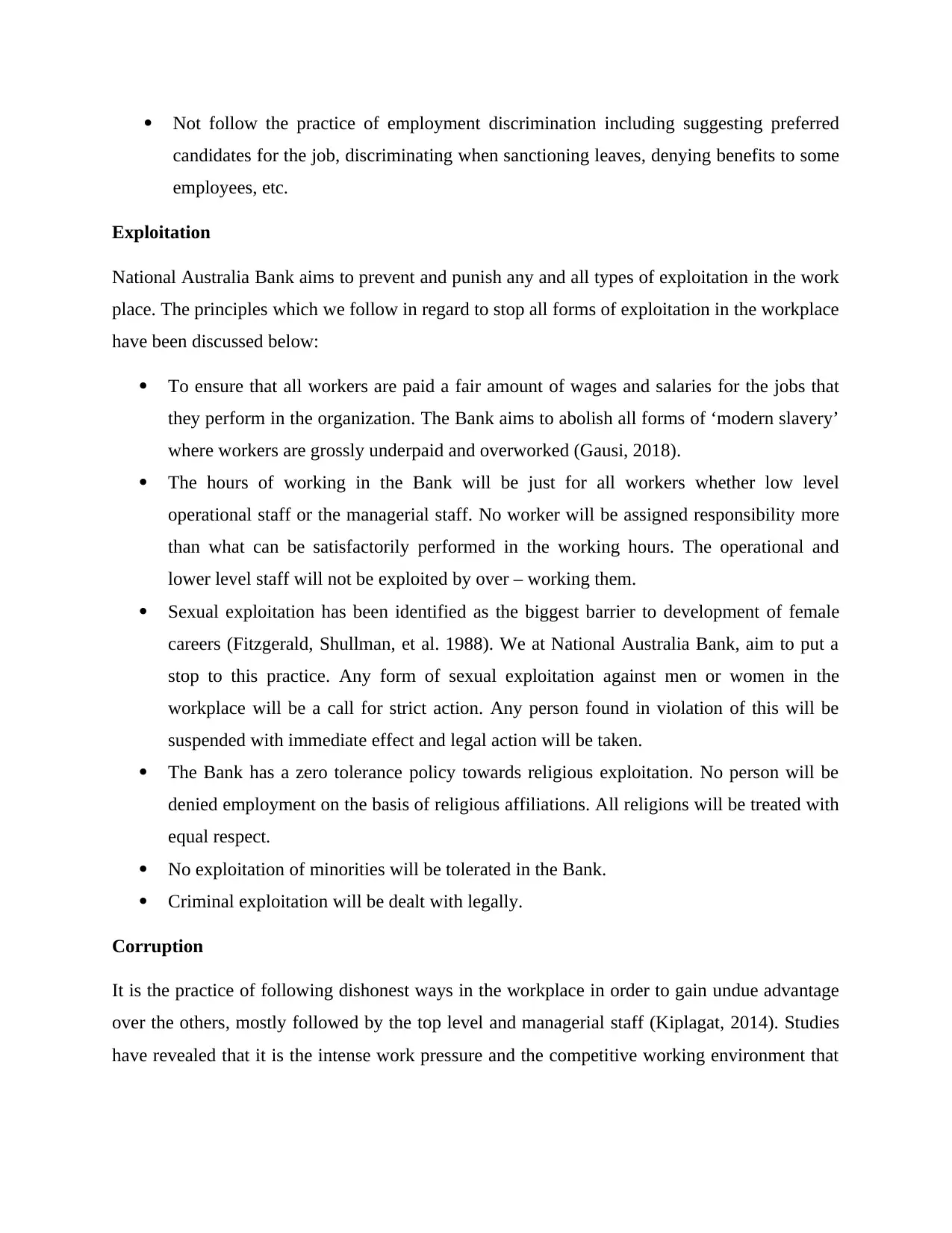
Not follow the practice of employment discrimination including suggesting preferred
candidates for the job, discriminating when sanctioning leaves, denying benefits to some
employees, etc.
Exploitation
National Australia Bank aims to prevent and punish any and all types of exploitation in the work
place. The principles which we follow in regard to stop all forms of exploitation in the workplace
have been discussed below:
To ensure that all workers are paid a fair amount of wages and salaries for the jobs that
they perform in the organization. The Bank aims to abolish all forms of ‘modern slavery’
where workers are grossly underpaid and overworked (Gausi, 2018).
The hours of working in the Bank will be just for all workers whether low level
operational staff or the managerial staff. No worker will be assigned responsibility more
than what can be satisfactorily performed in the working hours. The operational and
lower level staff will not be exploited by over – working them.
Sexual exploitation has been identified as the biggest barrier to development of female
careers (Fitzgerald, Shullman, et al. 1988). We at National Australia Bank, aim to put a
stop to this practice. Any form of sexual exploitation against men or women in the
workplace will be a call for strict action. Any person found in violation of this will be
suspended with immediate effect and legal action will be taken.
The Bank has a zero tolerance policy towards religious exploitation. No person will be
denied employment on the basis of religious affiliations. All religions will be treated with
equal respect.
No exploitation of minorities will be tolerated in the Bank.
Criminal exploitation will be dealt with legally.
Corruption
It is the practice of following dishonest ways in the workplace in order to gain undue advantage
over the others, mostly followed by the top level and managerial staff (Kiplagat, 2014). Studies
have revealed that it is the intense work pressure and the competitive working environment that
candidates for the job, discriminating when sanctioning leaves, denying benefits to some
employees, etc.
Exploitation
National Australia Bank aims to prevent and punish any and all types of exploitation in the work
place. The principles which we follow in regard to stop all forms of exploitation in the workplace
have been discussed below:
To ensure that all workers are paid a fair amount of wages and salaries for the jobs that
they perform in the organization. The Bank aims to abolish all forms of ‘modern slavery’
where workers are grossly underpaid and overworked (Gausi, 2018).
The hours of working in the Bank will be just for all workers whether low level
operational staff or the managerial staff. No worker will be assigned responsibility more
than what can be satisfactorily performed in the working hours. The operational and
lower level staff will not be exploited by over – working them.
Sexual exploitation has been identified as the biggest barrier to development of female
careers (Fitzgerald, Shullman, et al. 1988). We at National Australia Bank, aim to put a
stop to this practice. Any form of sexual exploitation against men or women in the
workplace will be a call for strict action. Any person found in violation of this will be
suspended with immediate effect and legal action will be taken.
The Bank has a zero tolerance policy towards religious exploitation. No person will be
denied employment on the basis of religious affiliations. All religions will be treated with
equal respect.
No exploitation of minorities will be tolerated in the Bank.
Criminal exploitation will be dealt with legally.
Corruption
It is the practice of following dishonest ways in the workplace in order to gain undue advantage
over the others, mostly followed by the top level and managerial staff (Kiplagat, 2014). Studies
have revealed that it is the intense work pressure and the competitive working environment that
Paraphrase This Document
Need a fresh take? Get an instant paraphrase of this document with our AI Paraphraser
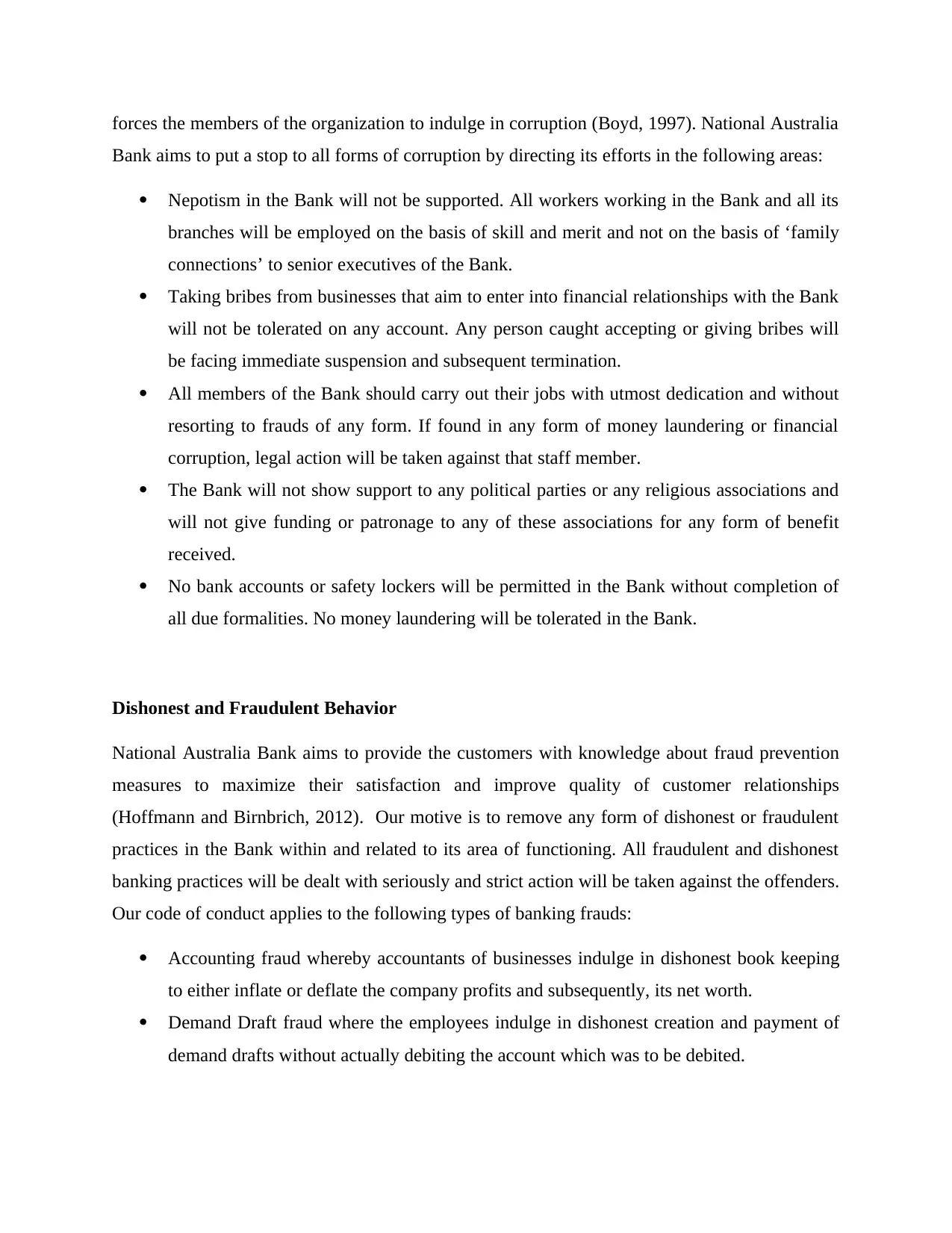
forces the members of the organization to indulge in corruption (Boyd, 1997). National Australia
Bank aims to put a stop to all forms of corruption by directing its efforts in the following areas:
Nepotism in the Bank will not be supported. All workers working in the Bank and all its
branches will be employed on the basis of skill and merit and not on the basis of ‘family
connections’ to senior executives of the Bank.
Taking bribes from businesses that aim to enter into financial relationships with the Bank
will not be tolerated on any account. Any person caught accepting or giving bribes will
be facing immediate suspension and subsequent termination.
All members of the Bank should carry out their jobs with utmost dedication and without
resorting to frauds of any form. If found in any form of money laundering or financial
corruption, legal action will be taken against that staff member.
The Bank will not show support to any political parties or any religious associations and
will not give funding or patronage to any of these associations for any form of benefit
received.
No bank accounts or safety lockers will be permitted in the Bank without completion of
all due formalities. No money laundering will be tolerated in the Bank.
Dishonest and Fraudulent Behavior
National Australia Bank aims to provide the customers with knowledge about fraud prevention
measures to maximize their satisfaction and improve quality of customer relationships
(Hoffmann and Birnbrich, 2012). Our motive is to remove any form of dishonest or fraudulent
practices in the Bank within and related to its area of functioning. All fraudulent and dishonest
banking practices will be dealt with seriously and strict action will be taken against the offenders.
Our code of conduct applies to the following types of banking frauds:
Accounting fraud whereby accountants of businesses indulge in dishonest book keeping
to either inflate or deflate the company profits and subsequently, its net worth.
Demand Draft fraud where the employees indulge in dishonest creation and payment of
demand drafts without actually debiting the account which was to be debited.
Bank aims to put a stop to all forms of corruption by directing its efforts in the following areas:
Nepotism in the Bank will not be supported. All workers working in the Bank and all its
branches will be employed on the basis of skill and merit and not on the basis of ‘family
connections’ to senior executives of the Bank.
Taking bribes from businesses that aim to enter into financial relationships with the Bank
will not be tolerated on any account. Any person caught accepting or giving bribes will
be facing immediate suspension and subsequent termination.
All members of the Bank should carry out their jobs with utmost dedication and without
resorting to frauds of any form. If found in any form of money laundering or financial
corruption, legal action will be taken against that staff member.
The Bank will not show support to any political parties or any religious associations and
will not give funding or patronage to any of these associations for any form of benefit
received.
No bank accounts or safety lockers will be permitted in the Bank without completion of
all due formalities. No money laundering will be tolerated in the Bank.
Dishonest and Fraudulent Behavior
National Australia Bank aims to provide the customers with knowledge about fraud prevention
measures to maximize their satisfaction and improve quality of customer relationships
(Hoffmann and Birnbrich, 2012). Our motive is to remove any form of dishonest or fraudulent
practices in the Bank within and related to its area of functioning. All fraudulent and dishonest
banking practices will be dealt with seriously and strict action will be taken against the offenders.
Our code of conduct applies to the following types of banking frauds:
Accounting fraud whereby accountants of businesses indulge in dishonest book keeping
to either inflate or deflate the company profits and subsequently, its net worth.
Demand Draft fraud where the employees indulge in dishonest creation and payment of
demand drafts without actually debiting the account which was to be debited.
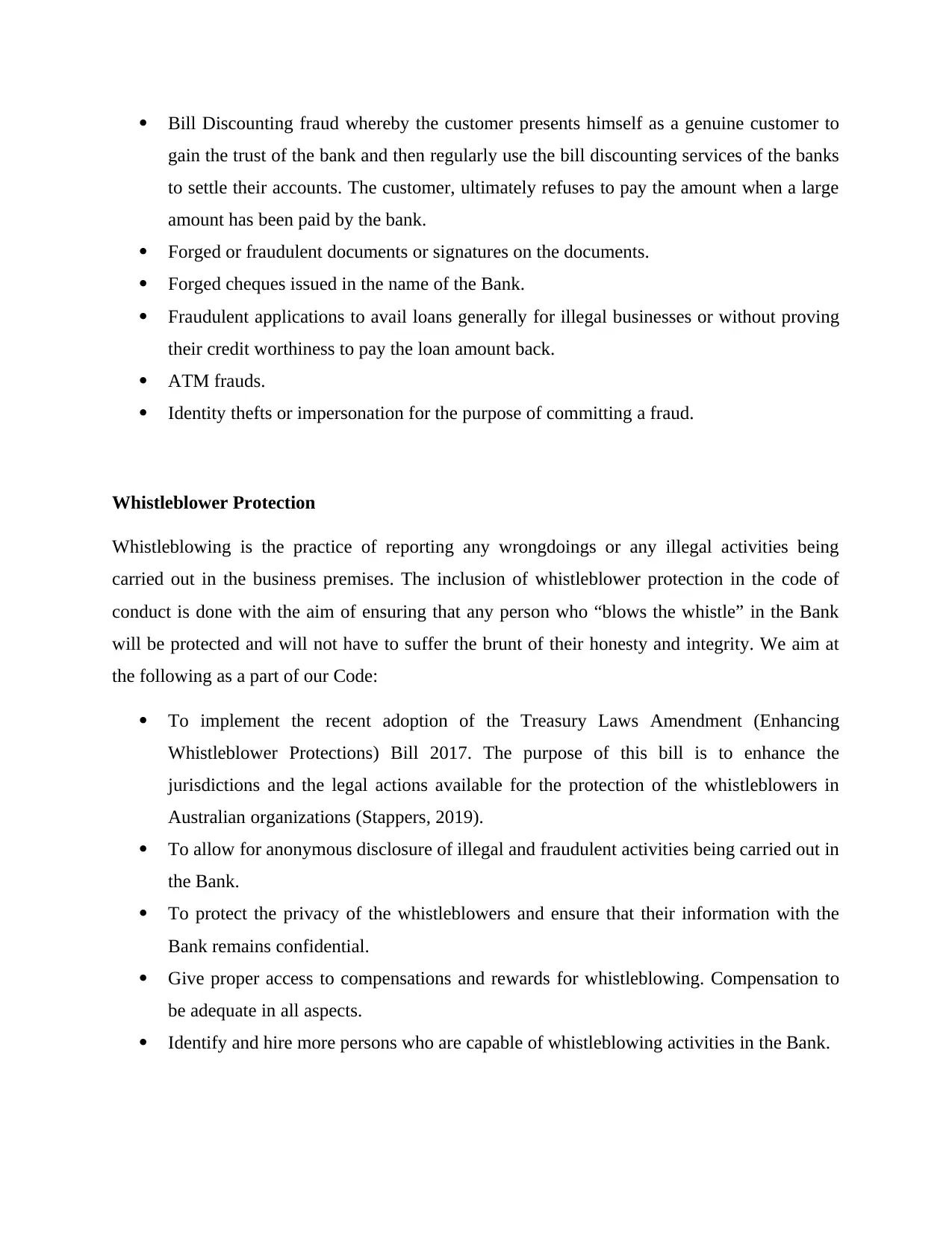
Bill Discounting fraud whereby the customer presents himself as a genuine customer to
gain the trust of the bank and then regularly use the bill discounting services of the banks
to settle their accounts. The customer, ultimately refuses to pay the amount when a large
amount has been paid by the bank.
Forged or fraudulent documents or signatures on the documents.
Forged cheques issued in the name of the Bank.
Fraudulent applications to avail loans generally for illegal businesses or without proving
their credit worthiness to pay the loan amount back.
ATM frauds.
Identity thefts or impersonation for the purpose of committing a fraud.
Whistleblower Protection
Whistleblowing is the practice of reporting any wrongdoings or any illegal activities being
carried out in the business premises. The inclusion of whistleblower protection in the code of
conduct is done with the aim of ensuring that any person who “blows the whistle” in the Bank
will be protected and will not have to suffer the brunt of their honesty and integrity. We aim at
the following as a part of our Code:
To implement the recent adoption of the Treasury Laws Amendment (Enhancing
Whistleblower Protections) Bill 2017. The purpose of this bill is to enhance the
jurisdictions and the legal actions available for the protection of the whistleblowers in
Australian organizations (Stappers, 2019).
To allow for anonymous disclosure of illegal and fraudulent activities being carried out in
the Bank.
To protect the privacy of the whistleblowers and ensure that their information with the
Bank remains confidential.
Give proper access to compensations and rewards for whistleblowing. Compensation to
be adequate in all aspects.
Identify and hire more persons who are capable of whistleblowing activities in the Bank.
gain the trust of the bank and then regularly use the bill discounting services of the banks
to settle their accounts. The customer, ultimately refuses to pay the amount when a large
amount has been paid by the bank.
Forged or fraudulent documents or signatures on the documents.
Forged cheques issued in the name of the Bank.
Fraudulent applications to avail loans generally for illegal businesses or without proving
their credit worthiness to pay the loan amount back.
ATM frauds.
Identity thefts or impersonation for the purpose of committing a fraud.
Whistleblower Protection
Whistleblowing is the practice of reporting any wrongdoings or any illegal activities being
carried out in the business premises. The inclusion of whistleblower protection in the code of
conduct is done with the aim of ensuring that any person who “blows the whistle” in the Bank
will be protected and will not have to suffer the brunt of their honesty and integrity. We aim at
the following as a part of our Code:
To implement the recent adoption of the Treasury Laws Amendment (Enhancing
Whistleblower Protections) Bill 2017. The purpose of this bill is to enhance the
jurisdictions and the legal actions available for the protection of the whistleblowers in
Australian organizations (Stappers, 2019).
To allow for anonymous disclosure of illegal and fraudulent activities being carried out in
the Bank.
To protect the privacy of the whistleblowers and ensure that their information with the
Bank remains confidential.
Give proper access to compensations and rewards for whistleblowing. Compensation to
be adequate in all aspects.
Identify and hire more persons who are capable of whistleblowing activities in the Bank.
⊘ This is a preview!⊘
Do you want full access?
Subscribe today to unlock all pages.

Trusted by 1+ million students worldwide
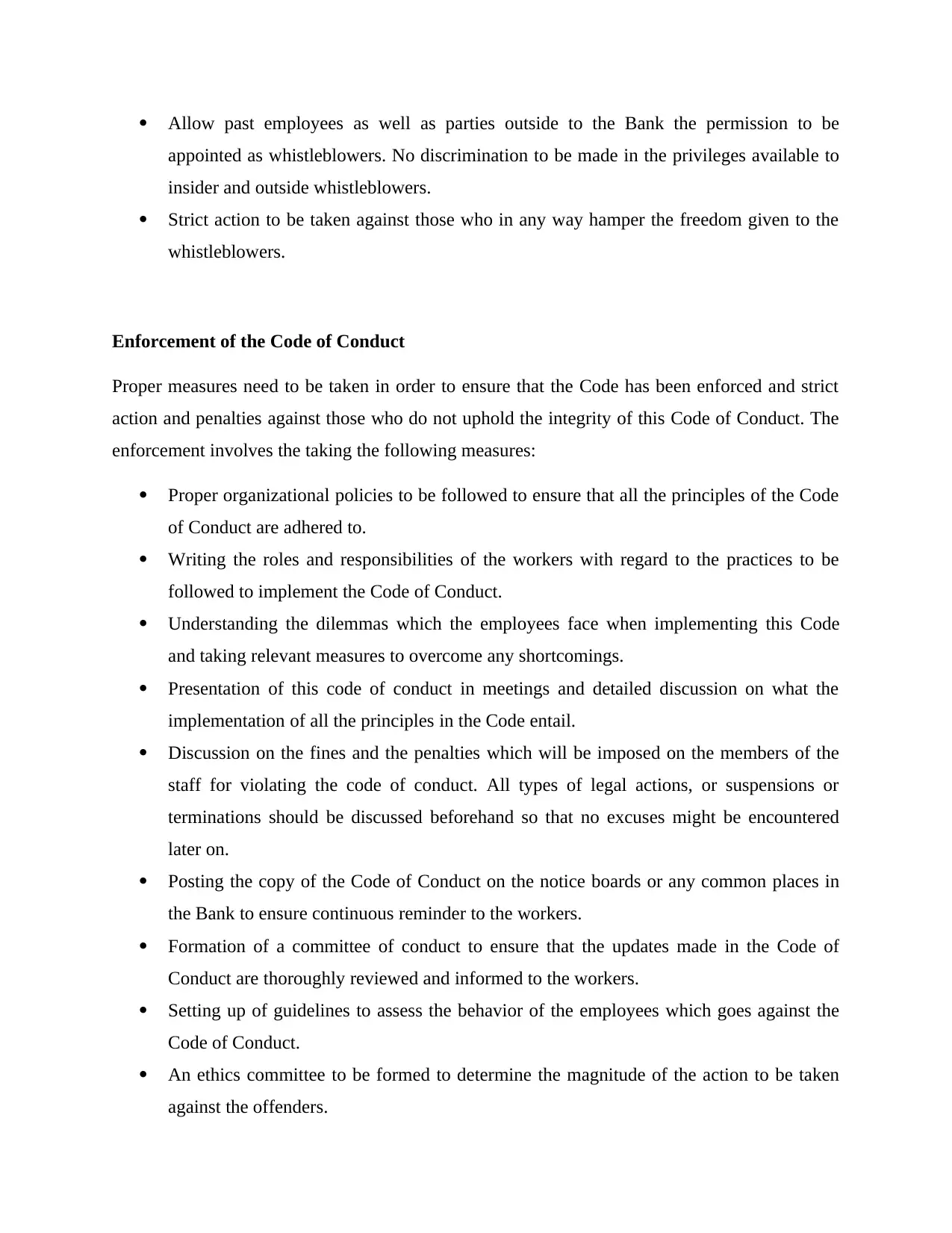
Allow past employees as well as parties outside to the Bank the permission to be
appointed as whistleblowers. No discrimination to be made in the privileges available to
insider and outside whistleblowers.
Strict action to be taken against those who in any way hamper the freedom given to the
whistleblowers.
Enforcement of the Code of Conduct
Proper measures need to be taken in order to ensure that the Code has been enforced and strict
action and penalties against those who do not uphold the integrity of this Code of Conduct. The
enforcement involves the taking the following measures:
Proper organizational policies to be followed to ensure that all the principles of the Code
of Conduct are adhered to.
Writing the roles and responsibilities of the workers with regard to the practices to be
followed to implement the Code of Conduct.
Understanding the dilemmas which the employees face when implementing this Code
and taking relevant measures to overcome any shortcomings.
Presentation of this code of conduct in meetings and detailed discussion on what the
implementation of all the principles in the Code entail.
Discussion on the fines and the penalties which will be imposed on the members of the
staff for violating the code of conduct. All types of legal actions, or suspensions or
terminations should be discussed beforehand so that no excuses might be encountered
later on.
Posting the copy of the Code of Conduct on the notice boards or any common places in
the Bank to ensure continuous reminder to the workers.
Formation of a committee of conduct to ensure that the updates made in the Code of
Conduct are thoroughly reviewed and informed to the workers.
Setting up of guidelines to assess the behavior of the employees which goes against the
Code of Conduct.
An ethics committee to be formed to determine the magnitude of the action to be taken
against the offenders.
appointed as whistleblowers. No discrimination to be made in the privileges available to
insider and outside whistleblowers.
Strict action to be taken against those who in any way hamper the freedom given to the
whistleblowers.
Enforcement of the Code of Conduct
Proper measures need to be taken in order to ensure that the Code has been enforced and strict
action and penalties against those who do not uphold the integrity of this Code of Conduct. The
enforcement involves the taking the following measures:
Proper organizational policies to be followed to ensure that all the principles of the Code
of Conduct are adhered to.
Writing the roles and responsibilities of the workers with regard to the practices to be
followed to implement the Code of Conduct.
Understanding the dilemmas which the employees face when implementing this Code
and taking relevant measures to overcome any shortcomings.
Presentation of this code of conduct in meetings and detailed discussion on what the
implementation of all the principles in the Code entail.
Discussion on the fines and the penalties which will be imposed on the members of the
staff for violating the code of conduct. All types of legal actions, or suspensions or
terminations should be discussed beforehand so that no excuses might be encountered
later on.
Posting the copy of the Code of Conduct on the notice boards or any common places in
the Bank to ensure continuous reminder to the workers.
Formation of a committee of conduct to ensure that the updates made in the Code of
Conduct are thoroughly reviewed and informed to the workers.
Setting up of guidelines to assess the behavior of the employees which goes against the
Code of Conduct.
An ethics committee to be formed to determine the magnitude of the action to be taken
against the offenders.
Paraphrase This Document
Need a fresh take? Get an instant paraphrase of this document with our AI Paraphraser
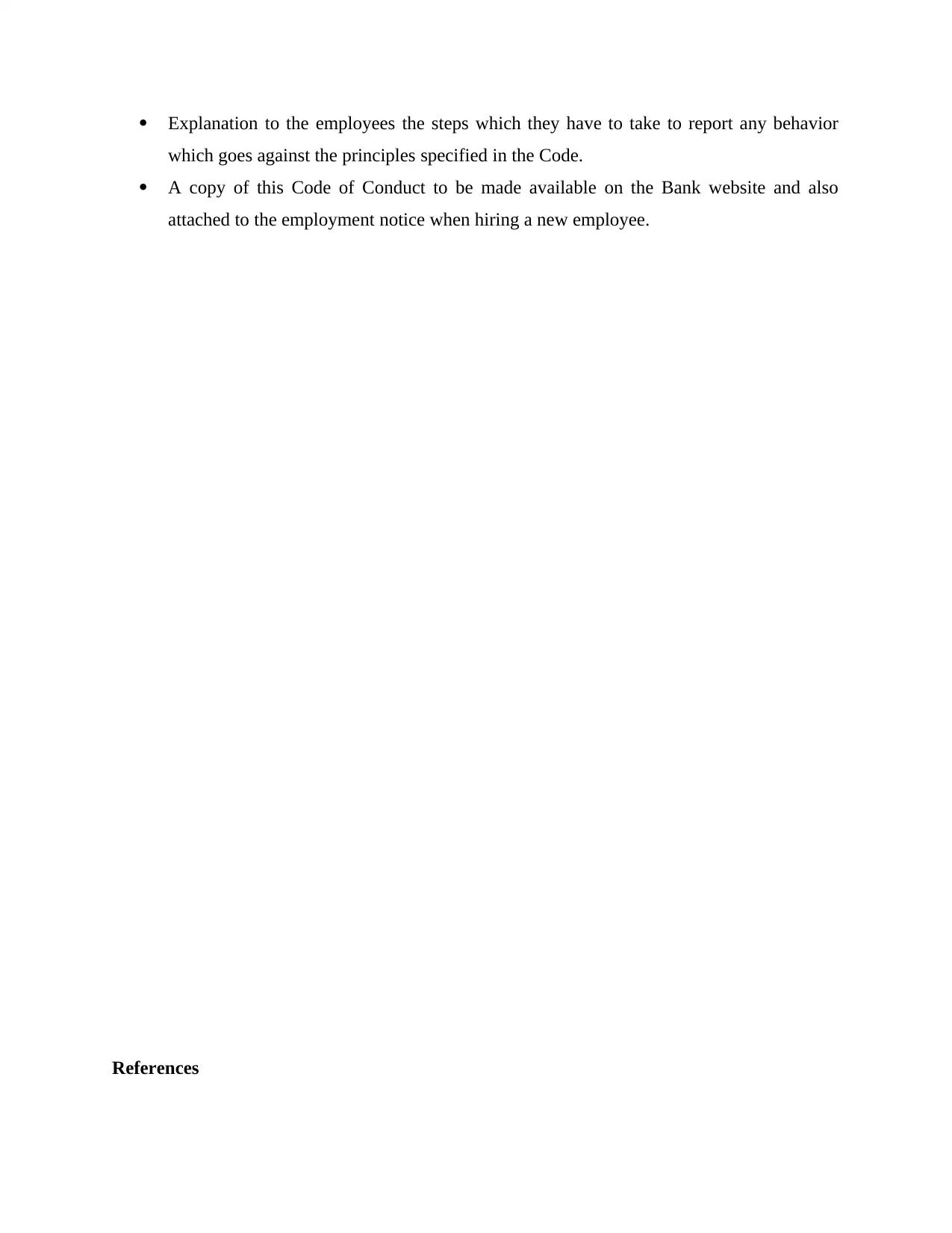
Explanation to the employees the steps which they have to take to report any behavior
which goes against the principles specified in the Code.
A copy of this Code of Conduct to be made available on the Bank website and also
attached to the employment notice when hiring a new employee.
References
which goes against the principles specified in the Code.
A copy of this Code of Conduct to be made available on the Bank website and also
attached to the employment notice when hiring a new employee.
References
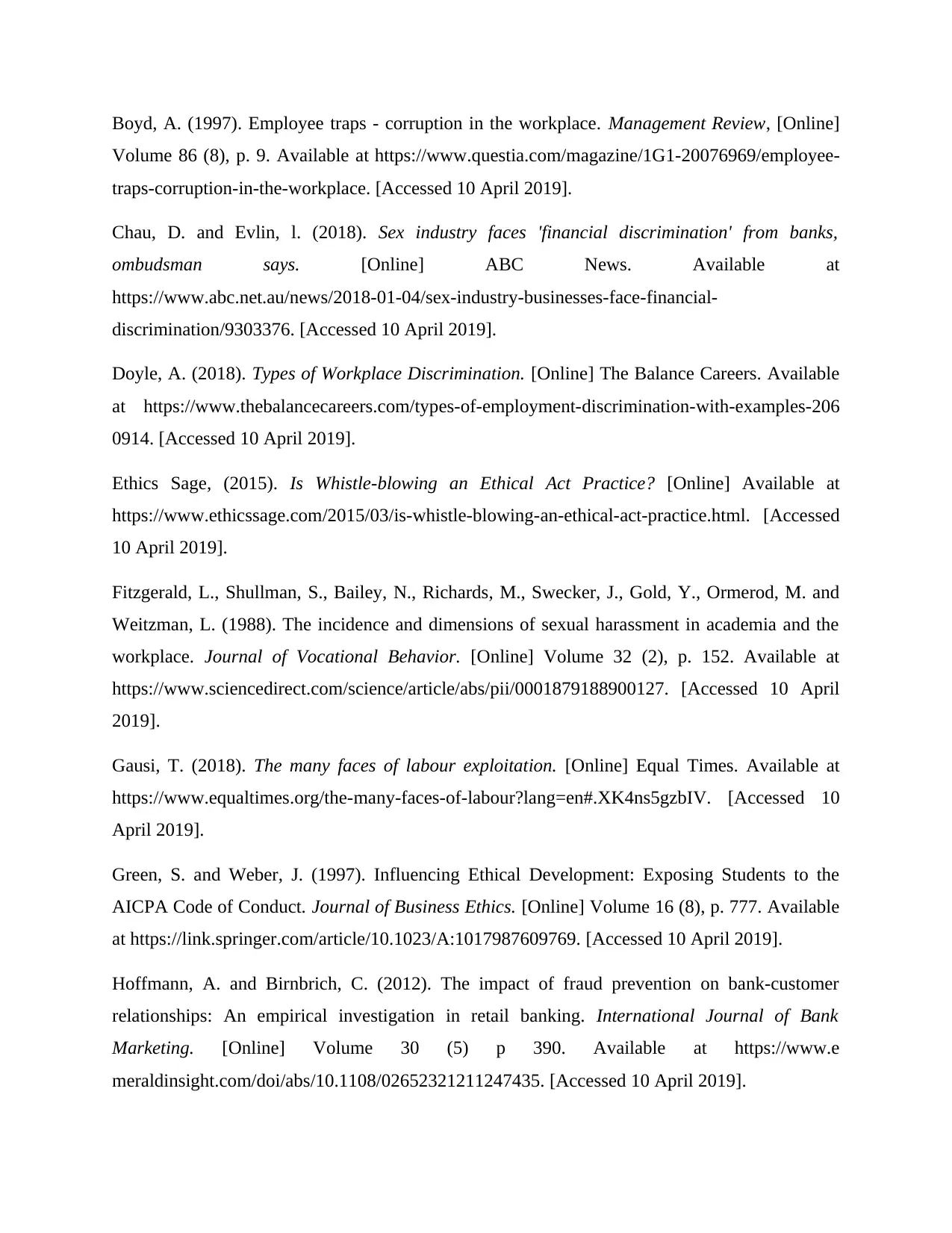
Boyd, A. (1997). Employee traps - corruption in the workplace. Management Review, [Online]
Volume 86 (8), p. 9. Available at https://www.questia.com/magazine/1G1-20076969/employee-
traps-corruption-in-the-workplace. [Accessed 10 April 2019].
Chau, D. and Evlin, l. (2018). Sex industry faces 'financial discrimination' from banks,
ombudsman says. [Online] ABC News. Available at
https://www.abc.net.au/news/2018-01-04/sex-industry-businesses-face-financial-
discrimination/9303376. [Accessed 10 April 2019].
Doyle, A. (2018). Types of Workplace Discrimination. [Online] The Balance Careers. Available
at https://www.thebalancecareers.com/types-of-employment-discrimination-with-examples-206
0914. [Accessed 10 April 2019].
Ethics Sage, (2015). Is Whistle-blowing an Ethical Act Practice? [Online] Available at
https://www.ethicssage.com/2015/03/is-whistle-blowing-an-ethical-act-practice.html. [Accessed
10 April 2019].
Fitzgerald, L., Shullman, S., Bailey, N., Richards, M., Swecker, J., Gold, Y., Ormerod, M. and
Weitzman, L. (1988). The incidence and dimensions of sexual harassment in academia and the
workplace. Journal of Vocational Behavior. [Online] Volume 32 (2), p. 152. Available at
https://www.sciencedirect.com/science/article/abs/pii/0001879188900127. [Accessed 10 April
2019].
Gausi, T. (2018). The many faces of labour exploitation. [Online] Equal Times. Available at
https://www.equaltimes.org/the-many-faces-of-labour?lang=en#.XK4ns5gzbIV. [Accessed 10
April 2019].
Green, S. and Weber, J. (1997). Influencing Ethical Development: Exposing Students to the
AICPA Code of Conduct. Journal of Business Ethics. [Online] Volume 16 (8), p. 777. Available
at https://link.springer.com/article/10.1023/A:1017987609769. [Accessed 10 April 2019].
Hoffmann, A. and Birnbrich, C. (2012). The impact of fraud prevention on bank‐customer
relationships: An empirical investigation in retail banking. International Journal of Bank
Marketing. [Online] Volume 30 (5) p 390. Available at https://www.e
meraldinsight.com/doi/abs/10.1108/02652321211247435. [Accessed 10 April 2019].
Volume 86 (8), p. 9. Available at https://www.questia.com/magazine/1G1-20076969/employee-
traps-corruption-in-the-workplace. [Accessed 10 April 2019].
Chau, D. and Evlin, l. (2018). Sex industry faces 'financial discrimination' from banks,
ombudsman says. [Online] ABC News. Available at
https://www.abc.net.au/news/2018-01-04/sex-industry-businesses-face-financial-
discrimination/9303376. [Accessed 10 April 2019].
Doyle, A. (2018). Types of Workplace Discrimination. [Online] The Balance Careers. Available
at https://www.thebalancecareers.com/types-of-employment-discrimination-with-examples-206
0914. [Accessed 10 April 2019].
Ethics Sage, (2015). Is Whistle-blowing an Ethical Act Practice? [Online] Available at
https://www.ethicssage.com/2015/03/is-whistle-blowing-an-ethical-act-practice.html. [Accessed
10 April 2019].
Fitzgerald, L., Shullman, S., Bailey, N., Richards, M., Swecker, J., Gold, Y., Ormerod, M. and
Weitzman, L. (1988). The incidence and dimensions of sexual harassment in academia and the
workplace. Journal of Vocational Behavior. [Online] Volume 32 (2), p. 152. Available at
https://www.sciencedirect.com/science/article/abs/pii/0001879188900127. [Accessed 10 April
2019].
Gausi, T. (2018). The many faces of labour exploitation. [Online] Equal Times. Available at
https://www.equaltimes.org/the-many-faces-of-labour?lang=en#.XK4ns5gzbIV. [Accessed 10
April 2019].
Green, S. and Weber, J. (1997). Influencing Ethical Development: Exposing Students to the
AICPA Code of Conduct. Journal of Business Ethics. [Online] Volume 16 (8), p. 777. Available
at https://link.springer.com/article/10.1023/A:1017987609769. [Accessed 10 April 2019].
Hoffmann, A. and Birnbrich, C. (2012). The impact of fraud prevention on bank‐customer
relationships: An empirical investigation in retail banking. International Journal of Bank
Marketing. [Online] Volume 30 (5) p 390. Available at https://www.e
meraldinsight.com/doi/abs/10.1108/02652321211247435. [Accessed 10 April 2019].
⊘ This is a preview!⊘
Do you want full access?
Subscribe today to unlock all pages.

Trusted by 1+ million students worldwide
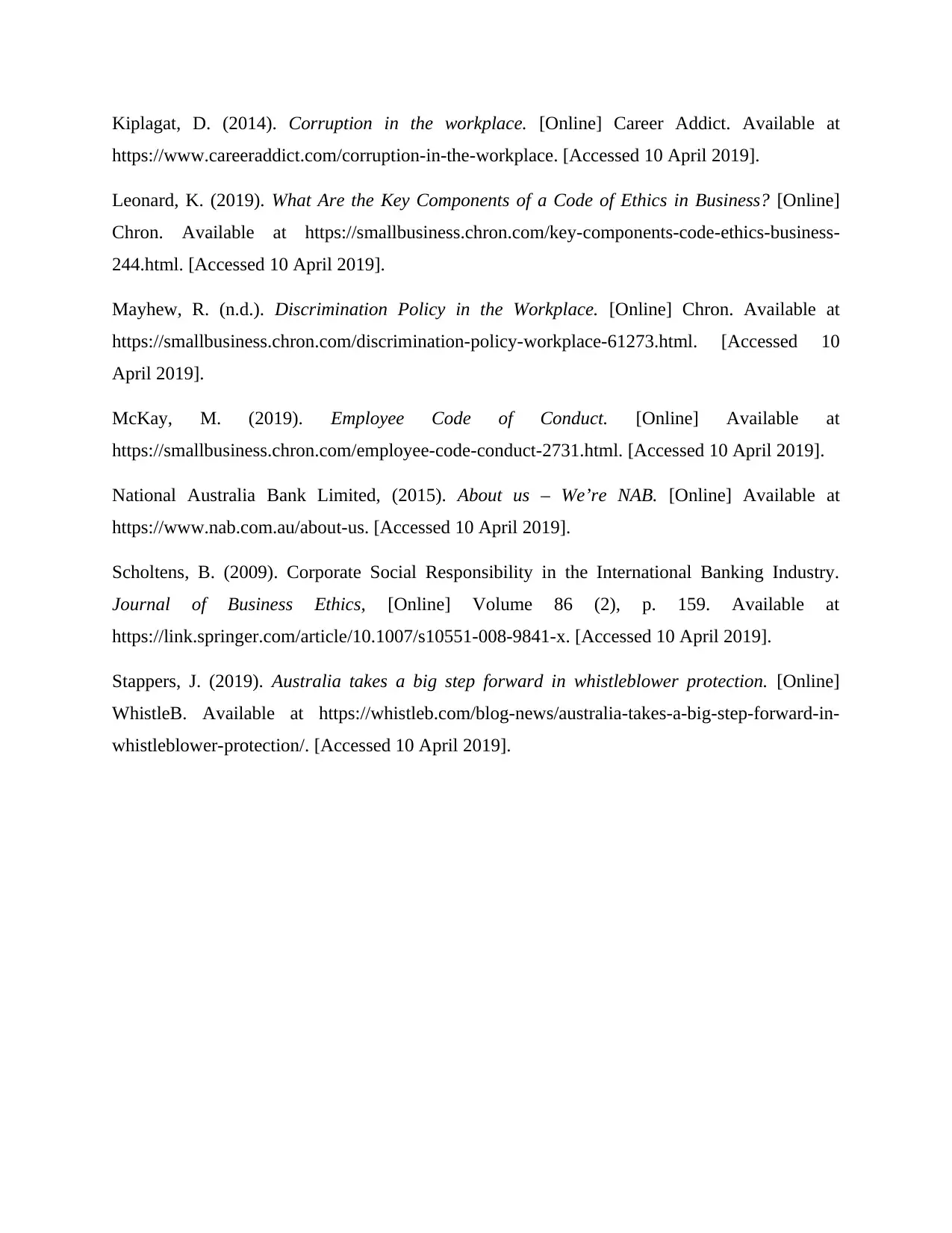
Kiplagat, D. (2014). Corruption in the workplace. [Online] Career Addict. Available at
https://www.careeraddict.com/corruption-in-the-workplace. [Accessed 10 April 2019].
Leonard, K. (2019). What Are the Key Components of a Code of Ethics in Business? [Online]
Chron. Available at https://smallbusiness.chron.com/key-components-code-ethics-business-
244.html. [Accessed 10 April 2019].
Mayhew, R. (n.d.). Discrimination Policy in the Workplace. [Online] Chron. Available at
https://smallbusiness.chron.com/discrimination-policy-workplace-61273.html. [Accessed 10
April 2019].
McKay, M. (2019). Employee Code of Conduct. [Online] Available at
https://smallbusiness.chron.com/employee-code-conduct-2731.html. [Accessed 10 April 2019].
National Australia Bank Limited, (2015). About us – We’re NAB. [Online] Available at
https://www.nab.com.au/about-us. [Accessed 10 April 2019].
Scholtens, B. (2009). Corporate Social Responsibility in the International Banking Industry.
Journal of Business Ethics, [Online] Volume 86 (2), p. 159. Available at
https://link.springer.com/article/10.1007/s10551-008-9841-x. [Accessed 10 April 2019].
Stappers, J. (2019). Australia takes a big step forward in whistleblower protection. [Online]
WhistleB. Available at https://whistleb.com/blog-news/australia-takes-a-big-step-forward-in-
whistleblower-protection/. [Accessed 10 April 2019].
https://www.careeraddict.com/corruption-in-the-workplace. [Accessed 10 April 2019].
Leonard, K. (2019). What Are the Key Components of a Code of Ethics in Business? [Online]
Chron. Available at https://smallbusiness.chron.com/key-components-code-ethics-business-
244.html. [Accessed 10 April 2019].
Mayhew, R. (n.d.). Discrimination Policy in the Workplace. [Online] Chron. Available at
https://smallbusiness.chron.com/discrimination-policy-workplace-61273.html. [Accessed 10
April 2019].
McKay, M. (2019). Employee Code of Conduct. [Online] Available at
https://smallbusiness.chron.com/employee-code-conduct-2731.html. [Accessed 10 April 2019].
National Australia Bank Limited, (2015). About us – We’re NAB. [Online] Available at
https://www.nab.com.au/about-us. [Accessed 10 April 2019].
Scholtens, B. (2009). Corporate Social Responsibility in the International Banking Industry.
Journal of Business Ethics, [Online] Volume 86 (2), p. 159. Available at
https://link.springer.com/article/10.1007/s10551-008-9841-x. [Accessed 10 April 2019].
Stappers, J. (2019). Australia takes a big step forward in whistleblower protection. [Online]
WhistleB. Available at https://whistleb.com/blog-news/australia-takes-a-big-step-forward-in-
whistleblower-protection/. [Accessed 10 April 2019].
1 out of 10
Related Documents
Your All-in-One AI-Powered Toolkit for Academic Success.
+13062052269
info@desklib.com
Available 24*7 on WhatsApp / Email
![[object Object]](/_next/static/media/star-bottom.7253800d.svg)
Unlock your academic potential
Copyright © 2020–2026 A2Z Services. All Rights Reserved. Developed and managed by ZUCOL.




